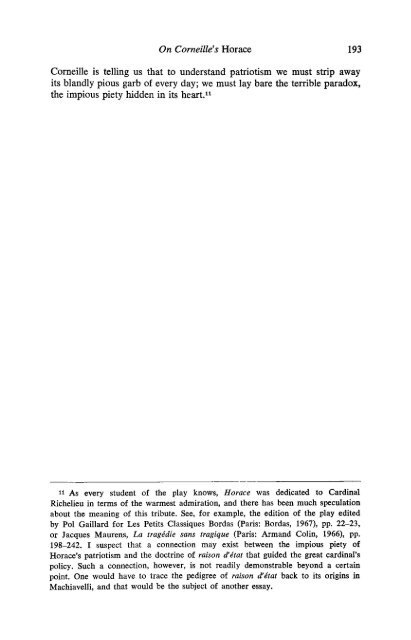Interpretation: A Journal of Political Philosophy
Interpretation: A Journal of Political Philosophy
Interpretation: A Journal of Political Philosophy
Create successful ePaper yourself
Turn your PDF publications into a flip-book with our unique Google optimized e-Paper software.
On Corneille's Horace 193<br />
Corneille is telling us that to understand patriotism we must strip away<br />
its blandly pious garb <strong>of</strong> every day; we must lay bare the terrible paradox,<br />
the impious piety hidden in its heart.11<br />
u As every student <strong>of</strong> the play knows, Horace was dedicated to Cardinal<br />
Richelieu in terms <strong>of</strong> the warmest admiration, and there has been much speculation<br />
about the meaning <strong>of</strong> this tribute. See, for example, the edition <strong>of</strong> the play edited<br />
by Pol Gaillard for Les Petits Classiques Bordas (Paris: Bordas, 1967), pp. 22-23,<br />
or Jacques Maurens, La tragedie sans tragique (Paris: Armand Colin, 1966), pp.<br />
198-242. I suspect that a connection may exist between the impious piety <strong>of</strong><br />
Horace's patriotism and the doctrine <strong>of</strong> raison d'etat that guided the great cardinal's<br />
policy. Such a connection, however, is not readily demonstrable beyond a certain<br />
point. One would have to trace the pedigree <strong>of</strong> raison d'etat back to its origins in<br />
Machiavelli,<br />
and that would be the subject <strong>of</strong> another essay.

















